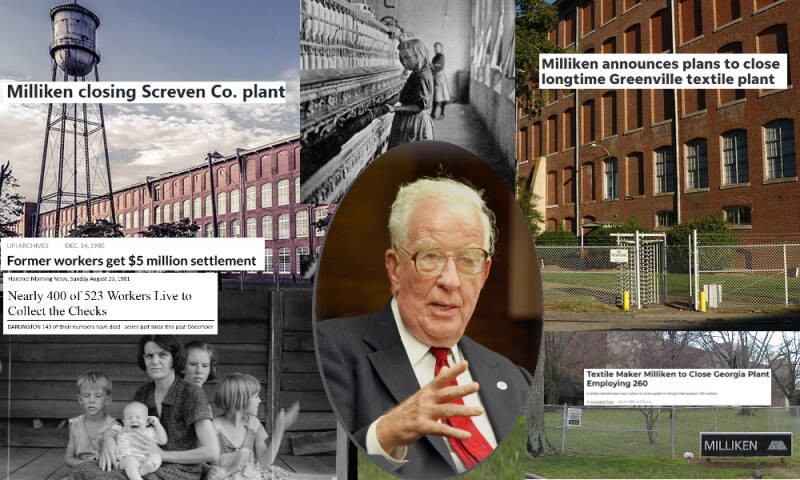Working For Milliken and Company
Executive Summary: Stay away from this mean-spirited, stingy, secretive private company.
- Transparency Score: 0
- Integrity Score: 0
- Corporate culture: Poor
- Business Prospects: Unknown
About the Company:
Milliken and Company is a privately held family owned business that traces its roots to 1865 when Seth Milliken began as a jobber (reseller) of dry goods and woolen textiles in Portland, Maine. By 1884 the company began acquiring textile mills in South Carolina. In 1947 32 year old grandson Roger Milliken took over the company and moved the headquarters to Spartanburg SC.
The young CEO soon became embroiled in one of the ugliest labor disputes in American history. 1956 company president Roger Milliken imposed several changes in working conditions at the Darlington SC mill that were unfavorable to the workers, including a requirement that workers work around the clock straight through Christmas eve and Christmas day. In response the workers at that mill voted to join a labor union, becoming the first Milliken mill to be unionized. Roger Milliken responded by firing all the workers in violation of federal labor law and closed the mill. Milliken fought a losing battle for 24 years to avoid paying back wages. In 1980 Milliken and Company settled the matter by paying $5 million dollars wages to the surviving 439 Darlington workers and the families of the 114 workers that died before Milliken settled the case.
Milliken grew the textile manufacturing business to a peak of 65 mills and 25,000 employees. As the United States embraced free trade the textile mills in the United States had difficulty competing against lower cost imported goods. Most of the Milliken mills were sold or closed and the company downsized to about 7,000 employees as of 2022. The company has diversified into several new fields including specialty chemicals, and healthcare. Roger Milliken passed away in 2010. Today the company is still privately owned and controlled by his children.
Milliken publishes no audited financial statements or other verifiable reports about the company’s business and operations. The company publishes many superlative claims (the Best…, First… Only…) but few of these claims can be verified. The secrecy leaves potential employees at a major disadvantage in evaluating the prospects of the company. Former employees report that employee turnover at Milliken as a result of voluntary resignations is 20% per year for salaried employees and over 50% per year for some hourly occupations. The Company will not reveal information about employee turnover that can be verified.
Transparency Score: 0
In the United States, companies that sell stock to the public are required by federal law to publish audited annual comprehensive financial statements (known as 10-K reports) that provide an enormous amount of information about the company’s business, risks, financial performance, trends, and senior management. Privately owned companies are not subject to the reporting requirement. Milliken & Company is a privately owned company that does not publish any audited financial statements or company reports. Employees cannot know if the company is making or losing money or whether the business is improving or declining. Management tells employees stories about how great the company is but the claims usually cannot be verified.
The company secrecy puts employees at a major disadvantage when trying to evaluate the career prospects of working for Milliken & Company.
Ethics Score: 0
For sixteen years Milliken has claimed to be one of the World’s Most Ethical Companies based on an award given to them by the Ethisphere Institute. The Ethisphere Institute has been criticized for accepting money from the companies that it rates, making the award seem like a purchased certificate, which is of course deceptive and therefore unethical.
Corporate Culture: Poor
With no published audited financial statements employees never know if the company is doing well or not. There are no celebrations when the company completes a successful year and no financial achievements published and celebrated. There are no employee bonuses, incentives, or profit sharing. There are never any Milliken company parties. Every new year employees are told things are tough and they need to do more with less. Goals and quotas are raised, but Milliken never offers financial incentives to employees.
Milliken pays what is required to recruit young management trainees, but as the years go by wages for existing workers do not keep up with inflation. During the years when the Milliken workforce shrank from 25,000 to 7,000, there was no upward mobility for employees. The company workforce seems to have stagnated around 7,000 employees for the last ten years.
Business Prospects: Unknown
In the 1980’s Milliken had about 25,000 employees and 65 textile mills in the United States. Most of the Milliken textile mills in the United States were sold or closed because they could not compete with lower cost imported textile goods. Today Milliken employs an estimated 7,000 employees. They have acquired several small businesses in healthcare and specialty chemicals. Because the company will not publish any audited financial reports, no one knows if business is improving or declining.
Without a doubt there are better opportunities with growing companies who publish audited company reports available for bright young individuals who are willing to work.

Create Your Own Website With Webador